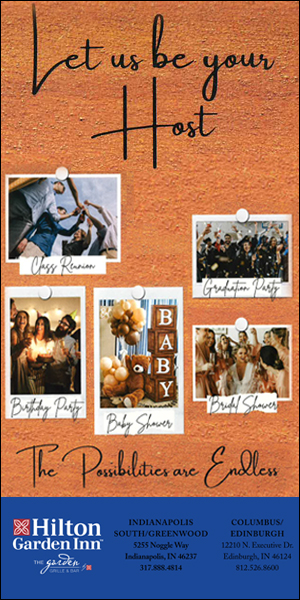
Indiana distilleries continue to multiply after 2013 legislation changes
By Clint Smith
Whiskey and bourbon production is commonly associated with our neighbors to the south, particularly Kentucky and Tennessee. But once you consider that a mind-numbing amount of Indiana corn is exported to these states, one wonders what’s holding Hoosiers back from gaining some credibility on our home turf?
A few years ago, the answer would have been legalities. But those restrictions have changed in recent years with the passing of the Indiana Artisan Distillers Act, a 2013 piece of legislation that (among other things) allows businesses to produce spirits and sell them by the bottle or glass directly to consumers on the distillery’s premises.
The legislation still has a few “quirks,” says Jeff Wuslich, co-founder of Cardinal Spirits in Bloomington. Despite the need for some lawful and linguistic improvements with the bill, Wuslich says craft spirit producers are now in a position to educate customers about their products and get feedback from their guests. Better still, he adds, the craft spirits production should be good for Indiana’s economic development.
Hoosiers are ready to wet their whistles with Indiana liquor, and Indiana distilleries are gearing up to feed the demand. Here’s proof.
Bear Wallow Distillery
»When Susan Spagnuolo decided to open her Bear Wallow Distillery in Brown County, she didn’t know that her dream of operating an artisan distillery wasn’t yet legal.
“Thankfully we discovered that there was a bill being presented to the Indiana Legislature that would allow it,” Spagnuolo says.
Bear Wallow, located in quaint Gnaw Bone, was incorporated in 2012. From the company’s incorporation through the start of production in 2014, Spagnuolo spent time working with legislators and Indiana distillers to get the law passed. A year-long permit process for the distillery followed the 2013 legalization, and Bear Wallow officially opened its doors to customers on Aug. 1, 2014.
“As one of the first artisan distilleries to open in the state, we are having fun being an agritourism business and educating people on how to turn Indiana grains into Indiana whiskeys,” Spagnuolo now says.
This spring, she hopes to finish an outdoor seating area and incorporate food trucks and live music into weekend scheduling. She also is hoping to get Bear Wallow’s products into liquor stores, bars and restaurants around the state. Plus, there’s more legal work to do: Spagnuolo is working with legislators on a bill that will allow craft distilleries to sell liquor on Sundays.
The Goods
»Bear Wallow specializes in whiskeys made from 100 percent Indiana grains — wheat, rye and malted barley. Gnaw Bone Bourbon, the distillery’s first aged offering, was released in December. Also available: the Hidden Holler corn whiskey “moonshine,” Liar’s Bench un-aged rye whiskey and Bear Trap 120-proof un-aged white whiskey. The distillery has gained local fame for its “Farm-to-Fifth” tours and the “Moonshine Shake-Up,” a favorite cocktail among guests. For more information, visit bearwallowdistillery.com.
Cardinal Spirits
»Having just begun full production in January, Cardinal Spirits is one of the latest additions to the craft-spirit scene. “We’ve been building our business since 2013,” says Jeff Wuslich, who, along with his partners, moved swiftly to open the Bloomington-based distillery and tasting room to the public in February 2014.
“Indiana has a reputation as an agricultural state,” he says, “and that’s true. We are excited to use local grain, grapes, lumber and botanicals for our spirits.” And then, there’s having just the right audience.
“Hoosiers are some of the best drinkers around,” Wuslich says. “They have discerning tastes and appreciate well-crafted products.”
The Goods
»Cardinal Spirits produces vodka, gins, whiskeys, liqueurs and rum. Wuslich notes that in addition to finding the company’s products behind the bar or at your local liquor store, Cardinal Spirits offers cocktails, food, tours and carry-out beverages in the distillery’s tasting room. For more information, visit cardinalspirits.com.
Heartland Distillers
»As opposed to some of the smaller distillers in Indiana, the 2013 artisan spirits legislation did not affect Indianapolis’ Heartland Distillers much. Founded in 2008, it remains a production distiller. Vodka, gin and bourbon aren’t distributed on the premises.
And for the time being, owner Stuart Hobson says Heartland will remain a production facility, but plans for the distillery include a tourist-friendly approach that will feature tours and public visits.
Recently Hobson also partnered with several industry friends to open a second production facility called Hobson & Roberts Distilling Co. The new company, located just west of downtown Indianapolis, features bourbon production, and the spirits will be distributed off-site.
“We’re doing things a little different than the craft guys,” says Hobson. “We’re going to be concentrating on producing our bourbon.”
The Goods
»Heartland Distillers specializes in vodka, also flavored vodkas, gin, bourbon and sorghum spirits. “Our original product is Indiana Vodka, a gold medal-winning vodka,” Hobson says. “We’ve since come out with Prohibition Gin, Sorghum Spirits and Spring Mill Bourbon.” At the end of January, the Hobson & Roberts Distilling Co. released its Spirit of America Bourbon, available in Indiana through Republic National Distributing. For more information, visit heartlanddistillers.com.
Starlight Distillery
»Certain legalities allowed Clark County’s Starlight Distillery, founded in 2001 and an offshoot of Huber Winery, to produce fruit-based liquors such as brandies and applejack long before the state laws changed. The 2013 Artisan Distillers Act simply helped the company to expand its product line, says Dana Huber, Starlight owner.
New laws have allowed the company’s venture into the production of vodka, gin, bourbon and whiskey, and the changes also led to the construction of a 12,500-square-foot building in Starlight that serves as the company’s base of operations.
Now the distillery is in full production, with the company’s artisan distillers, Ted Huber and Jason Heiligenberg, incorporating techniques honed from years of wine production into their work.
The Goods
»At Starlight Distillery you’ll find several infusions (raspberry, strawberry and peach) and a pair of ports: ruby and blueberry. There are also more potent players: the distilled spirits that include five types of brandy (a Huber blend, grappa, private reserve, apple and “Applejack”); an “1843” gin; a corn-based vodka; and a bourbon whiskey. The straight bourbon whiskey is a small-batch, limited-edition variety available in numbered bottles. For more information, visit huberwinery.com.
Virtuoso Distillers
»In operation since 2008, Mishawaka’s Virtuoso Distillers relied on sales of its 100-percent rye vodka to keep afloat. The vodka runs through copper stills 18 times, says Steve Ross, Virtuoso owner; hence the spirit’s brand name: 18 Vodka. As opposed to traditional vodka-crafting methods that utilize wheat or potatoes, Virtuoso employs a rye-based recipe, which, according to Ross, “accounts for the smooth, creamy texture.”
But the passing of the Artisan Distillers Act offered the small distiller “a secondary income stream that is critical while we grow,” he says.
And grow the distillery has. The recent legal revisions have encouraged Ross to update his facilities, adding a bar where customers can taste and purchase available spirits, and the distillery now carries 10-gallon barrels of whiskey for purchase. “We are just beginning to release our whiskeys,” says Ross, “and those who have tasted them can only rave about how smooth they are.”
The Goods:
»In addition to its rye vodka, Virtuoso Distillers carries gin, two types of rye whiskey (a traditional and an early American variety), as well as raspberry liqueur and limoncello. For more information, visit 18vodka.com.


